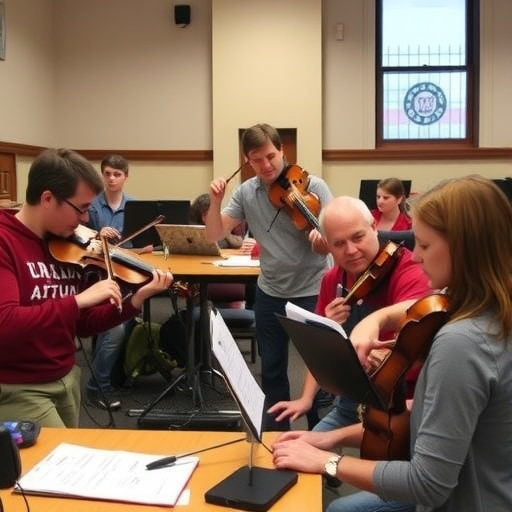In an era where educational approaches continuously evolve, service-learning has emerged as a transformative method in areas such as music education. A systematic review conducted by Hernández-Dionis, Pérez-Jorge, Santos-Álvarez, and their co-authors explores this innovative strategy, shedding light on how it can enhance musical training and the overall educational experience. Focusing on the intersection of service and learning, the review reveals the ways in which this pedagogical approach not only benefits students but also communities, offering a dual advantage.
Service-learning integrates community service with academic instruction, allowing students to apply musical skills in real-world contexts. This practical application stands in stark contrast to traditional music education methods that often emphasize solitary practice and performance. By actively engaging in community projects, learners gain firsthand experience in how music can foster social change and community cohesion. Such involvement not only bolsters their technical abilities but also nurtures a sense of empathy and civic responsibility.
The study outlines various projects where students collaborated with local organizations to provide music education to underserved populations. These initiatives include teaching music to children in low-income areas, organizing community concerts, and participating in musical therapy sessions for individuals with special needs. Each project showed that students gained significant musical knowledge while simultaneously developing essential life skills such as collaboration, communication, and leadership.
One of the core findings of this systematic review is the positive impact on student motivation. When students see the direct implications of their musical expertise in enhancing others’ lives, their engagement skyrockets. They perceive music education not merely as a means to personal advancement but as a vehicle for social contribution. This shift in perspective cultivates a richer educational atmosphere where students feel a deeper connection to their art form and the communities they serve.
Moreover, the authors emphasize the importance of reflection in the service-learning process. Engaging in structured reflection enables students to critically analyze their experiences, recognize the significance of their contributions, and understand the broader societal implications of music. This reflexivity amplifies the educational benefits of service-learning, empowering students to internalize what they have learned and apply it beyond the classroom.
Interestingly, the review highlights that service-learning can also fortify the relationship between music educators and the communities they operate within. Through collaborative projects, educators can better understand the unique cultural contexts of their students, leading to more tailored and relevant teaching methods. This deeper understanding fosters a symbiotic relationship, wherein educators and community members work together to cultivate a vibrant, inclusive musical landscape.
Additionally, the findings show that service-learning addresses some of the prevailing challenges in traditional music education, such as lack of engagement and diversity. By implementing community-focused projects that resonate with a wider audience, music programs can attract a more diverse student body and promote inclusivity in musical experiences. This diversity not only enriches the learning environment but also prepares students to be more adaptable musicians in an increasingly globalized world.
The authors of the review also explore the potential barriers to implementing service-learning in music education. One major hurdle is the lack of institutional support and resources dedicated to service-learning initiatives. Educational bodies must prioritize investments in training and materials that empower music educators to successfully incorporate service-learning in their curricula. By doing so, they can help dismantle the roadblocks that inhibit the adoption of this transformative approach.
Furthermore, the review acknowledges that effective assessment methods are crucial for measuring the impact of service-learning projects. Traditional evaluation metrics focused on technical proficiency might not capture the full spectrum of skills gained through service-learning experiences. Innovative assessment strategies, such as portfolio evaluations that showcase personal growth and community impact, are recommended to fully understand the benefits of this pedagogical approach.
Ultimately, the review posits that incorporating service-learning in music education may inspire a new generation of artists. As they engage with their communities, students will likely develop a more profound appreciation for the role of music as a tool for advocacy and change. This educational journey not only molds well-rounded musicians but also instills a sense of responsibility toward societal betterment.
As the conversation around music education evolves, Hernández-Dionis and their team provide a compelling argument for the integration of service-learning. The findings of their systematic review contribute valuable insights into how music can serve as a powerful conduit for education, social change, and community development. The study calls upon educational institutions to embrace service-learning as a core component of music education, paving the way for a more compassionate and engaged cohort of musicians.
In conclusion, the systematic review by Hernández-Dionis and colleagues showcases the manifold benefits of service-learning in music education. By bridging the gap between musical training and community service, this innovative approach enhances not only students’ artistic skills but also their commitment to fostering positive societal change. As music education continues to adapt to contemporary challenges, it is clear that service-learning offers a promising path toward a more impactful and inclusive future.
Subject of Research: The effectiveness of service-learning as a strategy in music education.
Article Title: Service-learning as a strategy for music education: a systematic review.
Article References: Hernández-Dionis, P., Pérez-Jorge, D., Santos-Álvarez, A.G. et al. Service-learning as a strategy for music education: a systematic review. Discover Educ 4, 474 (2025). https://doi.org/10.1007/s44217-025-00927-3
Image Credits: AI Generated
DOI: https://doi.org/10.1007/s44217-025-00927-3
Keywords: service-learning, music education, community engagement, educational strategies, experiential learning.




